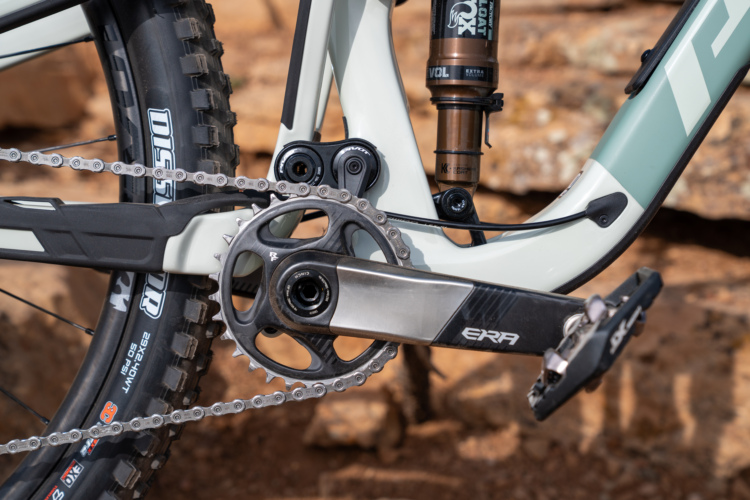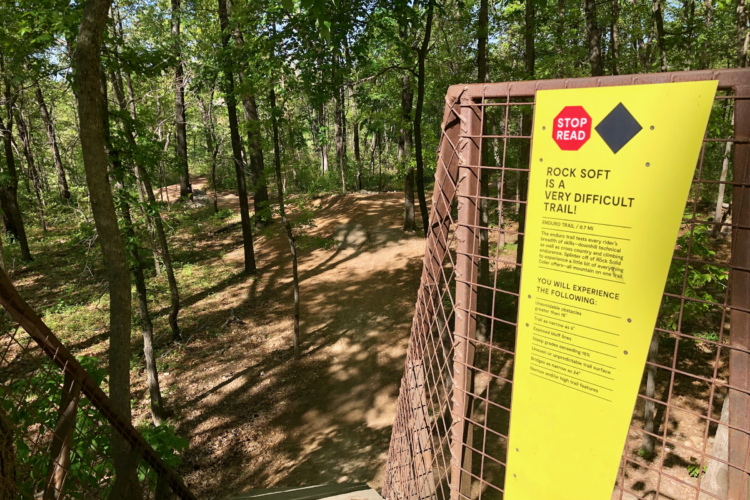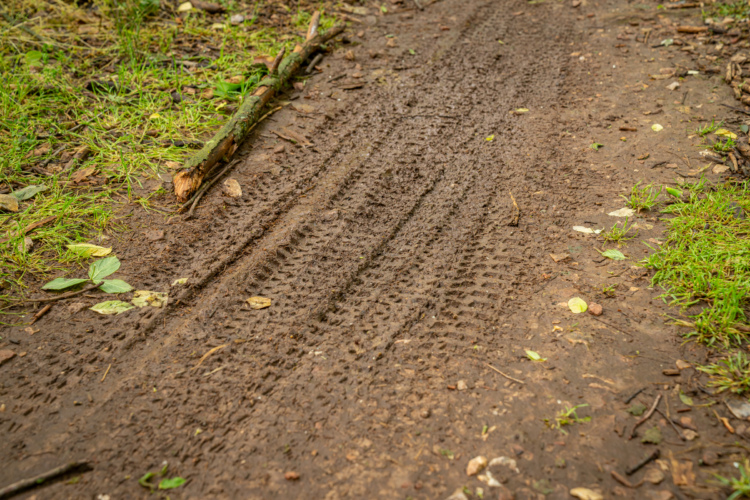The holidays have provided a great opportunity to step back from the busyness of work and the mountain bike world for a few days. Sure, I still got out on my bike, but the time off has made me feel a bit introspective lately.

After thinking about the mountain biking industry and why we do what we do, a question came to my mind:
“Do we take ourselves, and mountain biking, too seriously?”
Now, I’ll be the first to claim that road bikers take themselves way too seriously, and way more seriously than the average mountain biker does. While I enjoy road biking too, Sacred Rides’ recent article titled “10 Reasons Mountain Biking Is Better than Road Biking” is right on the money. And while mountain bikers are way more chill than road bikers, the question is unfortunately still on the table: do we take ourselves too seriously?
Before I dive in, I do have to acknowledge that the bike industry is a multi-billion-dollar industry, and anywhere there’s money to be made it’s serious business. Racers and industry professionals, and even writers like myself, put food on the table and keep the lights on by taking mountain biking seriously. And since very few industry professionals are becoming what anyone would call “rich,” it’s often a struggle to compete with the other guys for the few dollars that are available.
In light of this struggle, perhaps sometimes we as an industry take ourselves too seriously, and maybe it’s our fault for rubbing off on the average consumer. While I don’t necessarily know where the blame lies, here are three ways that I think we average mountain bikers take ourselves and mountain biking way too seriously:
Problem 1: Going Fast / Going Big
Of the three, this is probably the most minor point, but it’s worth noting. I’ve definitely ridden with people who obsess about their speed, cadence, heart rate, lactic threshold, and the aero-friction VS drag quotient of their jersey fabric. The pro racers who keep the power on with their finishing times aside, why are mountain bikers so caught up with going fast out on the trails? I mean, I like to go fast and it’s fun, but do we need to obsess about our speeds?
Some of the least-fun rides I’ve ever been on were rides where I was trying to push my speed, meet a time goal, or burn up a Strava segment. But whenever I do that, there’s no time to stop and take in the views, shoot a couple of photos, drink a beer and chat with friends, or session a gnarly rock garden until I clean it. It’s go, go, go, all the time.
Instead, try going slow on your mountain bike.

Think you’re immune since you ride gravity? Think again. This same mentality can even apply to the gravity scene, and instead of “go fast” it’s “go big.” Why do enthusiast riders, who aren’t in front of the movie camera for the next big flick, put their lives on the line to send a big jump? Oh sure, the adrenaline is awesome, and nailing something huge is super gratifying, but you know what kills that adrenaline buzz the quickest? Breaking your back. Breaking your arm or your leg will kill the buzz pretty well too, because you won’t be riding for many months to come.
You know what’s better than nailing a big jump and risking an injury that could keep you off of the bike for the rest of the season? Hitting smaller jumps, but riding every single day and not getting hurt.
Problem 2: Buying the Latest-and-Greatest Gear
Out of these three problems, I think the industry at large bears the burden of guilt for this one. Take, for example, the incremental component changes and improvements that we see every year. Sure, there have been some great advancements in recent years, including 1×11 drivetrains with clutch-style derailleurs, smoother suspension, and awesome dropper posts. But is it really worth it to upgrade the components that you just bought last year to the tune of thousands of dollars?
As a writer, I’m sure that I’ve been to blame for this before. For instance, I love carbon fiber for its low weight and vibration damping properties, and I’ve said so many times. Dang I love carbon. But have I ever actually paid out of pocket for a carbon bike, or even so much as a pair of carbon handlebars? Hell no, I can’t afford it on a writer’s salary!

As I said above, I love carbon, so I’m not here to hate on carbon or new improvements. However, I am here to advocate against getting caught up in the false impression that you need to upgrade every year to get the latest-and-greatest components. Last year’s model will work just fine, and to be honest, 2010’s products will as well. While we can’t really fault companies for trying to make money (that’s what they do), as consumers we don’t need to buy into all the marketing hype we read.
Bottom line: the best bike to ride is the bike you own, or the bike you can afford. Love what you have, and ride it into the ground.
Problem 3: Negativity
This is the problem that sparked my thought process over the holidays. While for some time we here on Singletracks have been largely immune to the flame wars that have marked other mountain bike websites and forums, I’m sad to say that as Singletracks continues to grow, we’re starting to see more and more vitriol in the comments section and on our Facebook page.
It seems like that’s the price of being a major publication these days, but I really have to wonder: why do people get so bent out of shape on the internet about mountain biking? Seriously, let’s take a step back people: we mountain bike because it’s fun. And if someone chooses to have fun in a different way than you, or chooses to express a differing opinion about this sport that we all love, what’s the point of getting all riled up to the point where you cuss them out and insult their character? While I think level-headed conversation and debate can be productive and interesting, when we reach a level of negativity and hatred where personal attacks and threats are bandied around, the discussion stops being fun for anyone involved in such a flame war.
With the going fast / going big problem, at least those guys are still out riding their bikes. They’re still mountain biking. With the problem of buying the latest-and-greatest gear, while I don’t think it’s smart to obsess about incremental improvements, for many people new gear fuels the desire to ride, and it often does perform better, even if it’s not that much better. However, when it comes to online flame wars about the sport of mountain biking, nobody involved is actually riding their bike at the time of the discussion, and there is absolutely no tangible benefit that comes from such an argument.
Solution
In my humble opinion, when we take the above things too seriously, mountain biking becomes not-fun–or at least, not as fun as it could be. It becomes work, it gets expensive, and it becomes stressful. Why would we want to “work” at biking after we work 40-60 hours a week at our jobs? Why can’t mountain biking be affordable, fun, and relaxing, a stress reliever, an escape from real life?
Answer: it can be. But to do so, I think we need to stop obsessing about things that don’t need to be obsessed about, and enjoy the ride. Heck, try not making any riding goals for 2014. Try not buying any new gear for your mountain bike. And try closing the web browser instead of responding to that idiot on the internet forum.
Grab your mountain bike, ride some singletrack, and have fun!























15 Comments
Jan 24, 2014
“. . . road bikers take themselves way too seriously, and way more seriously than the average mountain biker does.” That statement touched a nerve with me. There was a time not long ago that I would have wholeheartedly agreed and moved on. And although I still think it is true at its core, I also feel the gap is closing quickly. In the last couple of years I have run into a number of mountain bikers who take themselves very seriously. Of course, they all think they are pretty laid back. Perhaps we can be more objective by asking ourselves a few questions: When I ride do I always expect other people I run into to yield the trail to me, even if it means forcing whole families to the side? Have I ever told a person hiking a trail that they don’t belong because the trail was built for mountain bikers? Have I ever kept riding on a muddy trail, even though I was leaving two inch ruts in the tread? Do I fail to acknowledge others when I pass them on the trail, even if its just with a nod of the head?
These are all behaviors of mountain bikers I have experience personally or heard about on our trail system within the last year. Far from being “chill” these activities project clear self absorption. And isn’t that the trait we most like to associate with roadies? I feel we have lost some of what made mountain biking so desirable in its grass roots days.
Jan 20, 2014
Jan 20, 2014
Jan 20, 2014
You're right Greg; we all at some point take ourselves too seriously when we're just supposed to be having a good time.
Jan 21, 2014
Jan 20, 2014
1. I find myself thinking all the time about why I didn't hit a jump (because I'm plenty fast...haha), thinking about it over and over and watching videos of guys hitting insanely big jumps that I have no business even aspiring to. Sure, they are fun to watch, and more importantly, I think it is necessary to have goals, like jumps, to work on to grow as a mountain biker. But then I try a jump that has bothered me for a while, miss it, get hurt, and get pissed and my ride is ruined. Heck, I may not ride for a while after that. So yeah, I think it is important to chill out and know your limits: after all, most of us have to work for a living, which doesn't involve being on a mountain bike.
2. This is a core problem with America: commercialism. Capitalism is the catalyst to our success, but it is the poison to our happiness. I actually bought two very expensive carbon bikes last year, because I had been riding around on an old Titus for 9 years that I had fixed up countless times, and for the first time in my life, I got a nice job and could afford to replace it. I saved up for a long time, and I don't regret my purchases at all, but what REALLY bothers me is the little voice in the back of my mind that is driven by consumerism: maybe 650b is better? Does your bike have enough travel (it does)? Are your tires too heavy? Like most people, I do this with all of my hobbies, from SCUBA diving to snowboarding...because I ready mountain bike articles and go to bike shops. I'm 'weak for shiny' as my LBS puts it. Fortunately I have a wife who keeps me grounded; otherwise I probably would go off the deep end and go in debt. I wouldn't know what to do with the Greg Minaar limited edition SC V10, but I want it! More to the point, I wouldn't know it existed if I didn't read about it. That brings me to my third point.
3. My wife and I went running yesterday. As someone who typically hates running, I like it for two things: my wife does it with me and we spend time together, and it is relatively inexpensive. I mean, my nice running shoes put me back $65. Anyway, my wife talk when we run, and yesterday we were talking about the sermon we heard at church. I realize that not everyone reading this is 'religious', so I am not trying to proselytize you, but I wanted to share something. Part of the sermon was really on how the devil uses the internet for evil. Aside from the low hanging fruit of porn, and despite it's great many advantages, we started discussing all of the negative things about the internet. Which brings me back to your third point Greg: negativity. Take social media: it is so easy to say things to people on Facebook that you would probably never have the nerve to say in person. The internet is great because it has connected us, but it has disconnected us at the same time. There is certainly nothing wrong with using it, but when we substitute real-life interactions for cyber relationships, we forget how to act with people gracefully when we meet them in person. Especially strangers. Have you ever had a negative experience with a biker on a trail? I think we all have. Why? It's supposed to be chill. But here in Colorado we run into stuff like this all the time. Here is an example that has made me think hard about how we treat strangers on the trail.
For the past few months, I have been thinking about an ‘incident’ that happened in April when the BOMB group (Believers on Mountain Bikes) was riding up Mary’s Loop in Fruita. Not long before, we had just completed Horsethief and was in singletrack heaven, on our way to tackle Moore Fun. There was a relatively flat section, and we were going ever so slightly uphill when a young couple came down the trail and almost ran into/over us. Suddenly there was an argument about who had the right of way, because both parties thought they were going downhill. Mike and Adam were in the lead, and I was right behind them. I was proud to call them brothers as they kept their cool while the guy facing us was getting pretty upset over what I consider ‘nothing’ on this fine afternoon. There was some grumbling, and I think both parties left with a bad taste in their mouths. It has really made me think about how we portray ourselves as believers on mountain bikes…which can be really hard sometimes when you are in the middle of having fun, your adrenaline is pumping, and suddenly you get interrupted. Abruptly.
There will always be jerks on trails, but most people who *think* they are right are not jerks, probably really nice people like us, just a little stubborn in their ability to concede…like us.
We, as believers, are there to make a difference, an impact, perhaps a radical change in some ways. I contemplate that moment in Fruita over and over and over in my mind and I keep asking myself, ‘what could we have done differently? What should we do the next time it happens (and it will)?’
Being a Christian never means let others run over you (figuratively and literally) but the thought crossed my mind, how blown away these two people would have been if one of us approached them and just politely said “hey, you may be right. I thought I was, but I am not willing to ruin your riding experience over this, so I am sorry. I am a Christian, and I believe in making things right and loving others, so take this as a small token of my/our apology…”. Then, hand them a $10 Subway card with a scripture on it and ride away.
How crazy cool would that be?! Hopefully it would leave them disarmed, puzzled, speechless, and curious about our love for Christ, and tell their friends about this weird encounter. So…I am going to try to start bringing a gift card along with me when I ride, with a little note and an encouraging Word, so that we have a tangible tool to diffuse people’s hate/fear/selfishness…and eat some of my own humble pie in the process.
Now, after buying two carbon bikes, I don't have the money to hand out a gift card to everyone that looks at me funny on the trail, but my point is this (whether you are Christian or not): treat people nicely. I think Greg is right on the money with this article, in that things like social media and commercialism can really change who we are (negatively) and impact how react to others. If that happens, it is proof that our species is devolving socially.
Jan 23, 2014
Not to nitpick or start an argument, and maybe the rules in Fruita are different, but general mtb etiquette is for the rider that is going downhill to yield to the rider going uphill. http://www.imba.com/about/rules-trail
Jan 20, 2014
[X] Like
As for taking ourselves too seriously, I humbly submit this photo from a little local night time TT last Friday night.
http://www.flickr.com/photos/andyjordans/12049858944/
If the folks you ride with are too serious, find new people to ride with!!
Jan 20, 2014
Sorry to hear about your bad experience in Fruita, but like you said, the bad experiences in real life, out on the trail, are few and far between, whereas when people are on the internet hiding behind a mask of anonymity, for some reason they feel totally free to just let loose with all of the hate. But I wonder why that is? Do they feel safe behind the screen? Or do they just not realize that the person on the other side of the screen is another human with feelings and emotions as well?
Complicated stuff... thanks for chiming in!
Jan 20, 2014
Jan 22, 2014
Jan 21, 2014
Jan 23, 2014
Jan 23, 2014
Jan 24, 2014